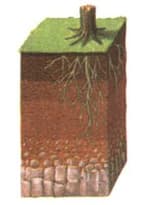Explain how soil is formed.

Important Questions on Soil
Discuss the factors affecting climate of a place.
Some words in the passage below are missing. As you read the passage, fill in the correct words.
Soil is the loose top layer of the Earth's surface. Plants depend on soil. It holds them up. It provides them with food and water. Soil is made of _____ (fungi, humus, particles). These very small pieces mostly come from rocks broken down by weathering. Other soil particles come from the rotting remains of plants and animals. The part of the soil that comes from living things is called _____ (loam, organic matter, texture).
Many small organisms live in the soil. They include worms, bacteria, and fungi. _____ (fungi, humus, particles) are like plants, but they aren't green. And they have no leaves, flowers, or roots. The organisms feed on dead plants and animals. They cause them to _____ (decay, particles, loam), or breakdown. The decayed plant and animal matter is called _____ (fungi, humus, loam). Humus makes the soil dark. It provides nutrients plants need to grow.
Soil develops in layers. The top layer consists mostly of humus. It is called _____ (bedrock, topsoil, subsoil). The next layer down is called _____ (bedrock, topsoil, subsoil). The subsoil contains more rock particles than topsoil and less humus. It is not as good for growing plants. The layer below the subsoil has many pieces of rocks. The pieces get bigger when they are deeper in the ground. Most plants cannot grow in this rocky layer. The soil layers all rest on solid rock. It is called _____ (bedrock, topsoil, subsoil). The pieces of rock in the soil come from bedrock.
Label the diagram given below and answer the following questions:

a) The layer with less amount of humus but more of minerals_____.
b) The layer which is hard and difficult to dig with a spade:_____.
c) The most fertile and porous layer _____.
d) The layer which is made up of lumps and crevices _____
